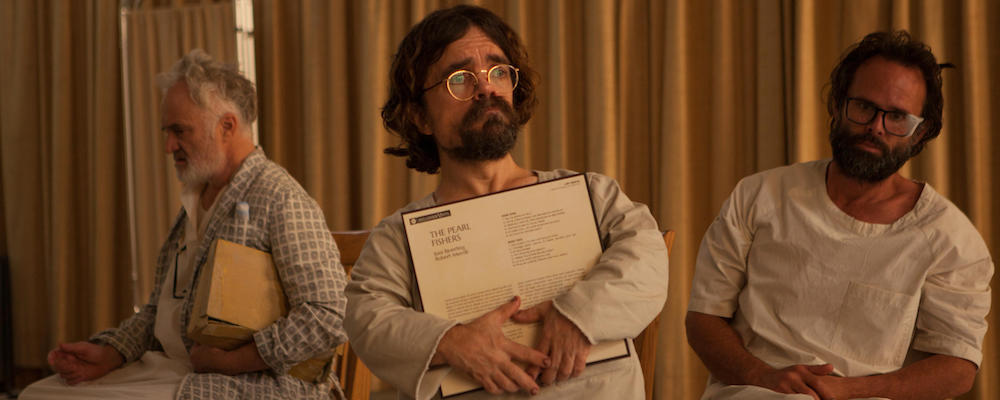‘Three Christs’ Explores How Far We Have Come in Dealing With Mental Illness, and How Far We Still Need to Go
Sandra Miska
The fascinating case study of three paranoid schizophrenics who think they’re Jesus Christ in 1959 Michigan is brought to life in “Three Christs.” Despite having a premise that may come across as somewhat outlandish, this indie drama takes an empathetic look at mentally ill patients, using this case to explore the then radical notion that those experiencing delusions should be treated as humans.
Based on the book “The Three Christs of Ypsilanti” by Milton Rokeach, “Three Christs” stars Richard Gere as the fictional Dr. Alan Stone, a psychology professor who leaves his ivy tower to work in the field at a state-run mental hospital. There, he encounters two patients, Joseph Cassel (Peter Dinklage) and Clyde Benson (Bradley Whitford), who both claim to be Jesus Christ. Desiring to study theories on identity, Stone puts the two together for regular sessions with a third “Christ” he seeks out, Leon Gabor (Walton Goggins). Opposed to many of the treatment methods for mental illness of the time, including lobotomies, electroshock therapy, and heavy medicating, he believes that what we now call group therapy will force the men to confront reality.
“Three Christs” was directed and co-written by Jon Avnet, who explained to Entertainment Voice how he set out to make something entertaining, provocative, and thought-provoking. “I liked the whole idea of exploring identity and who are you, who tells you who you can be and who you can’t be.”
He ultimately succeeds in his goal of humanizing the men, particularly Joseph, a dwarf who was abused as a child. According to Avnet, Dinklage, ever the dedicated actor, asked a great question before filming. “‘How do you play someone who is insane? I don’t want to use tropes.’ I said, ‘You play them sane.’”
Indeed, the sincerity in which Dinklage portrays Joseph adds depth to the character, whose delusions are the grandest of the three. With his love of culture and habit of writing letters to the president, he could have easily been an object of ridicule, but Dinklage, under Avnet’s direction, makes Joseph likable, even endearing. The opera music he listens to, particularly “The Pearl Fishers” sung by Jussi Björlin, amplifies emotions.
“The human voice is godlike in many ways. It transports you to another place. He was sharing something with Dr. Stone that he loves,” said Avnet. “I was looking for ways of expressing what was joyous to him, so that you as an audience can understand him not as a patient, but as a person.
Predictably, complications arise once Stone gets too involved with his patients, even crossing ethical boundaries. His unorthodox methods put him at odds with Dr. Orbus (Kevin Pollak), his boss who lacks Stone’s human touch. All of this leads to a tragic scene in which Joseph proves himself to be as Christ-like as they come. Despite uncovering a betrayal from Stone, he knows that is was always the doctor’s intent to help him, not hurt him. Explained Avnet, “It is literally like the kiss of Jesus.”
Another pivotal character is Becky Anderson (Charlotte Hope), a recent college grad with a degree in psychology who is thrown in the deep end after she accepts a position as Stone’s assistant. All the men project on the attractive young woman, as does Ruth (Julianna Margulies), Stone’s wife and former assistant who sees herself in her. Ultimately, the two female characters form a bond in an intriguing scene. Through Becky and Stone, it is explored how people are often drawn to work in psychology as a way to deal with their own demons.
Although the way we as a society view mental health has drastically changed in the last 60 years, Avnet believes that we still have a long way to go. He points to the fact that prisons are filled with those in need of psychiatric help, and that cops are often left to deal with those whose mental illnesses have driven them to the streets.
“[Homeless people] should be in halfway houses, they should be cared for, they should be fed, they should have medical treatment, they should have therapy. It’s a disgrace what’s happening in this country. No one talks about the fact that you need to allocate the money not just to house them and get them off the streets, but to give them a life, have someone listen to them.”
Indeed. “Three Christs” is a film that is sure to be a conversation starter, as was the case with a television film Avnet previously executive produced, “The Burning Bed.”
“When I did ‘The Burning Bed” many years ago, which was about domestic violence, the movie had such an impact on domestic violence that the battered woman syndrome became a legal defense in most states. I still think more can be done, by the way.”
“Three Christs” opens Jan. 10 in select theaters and VOD.

